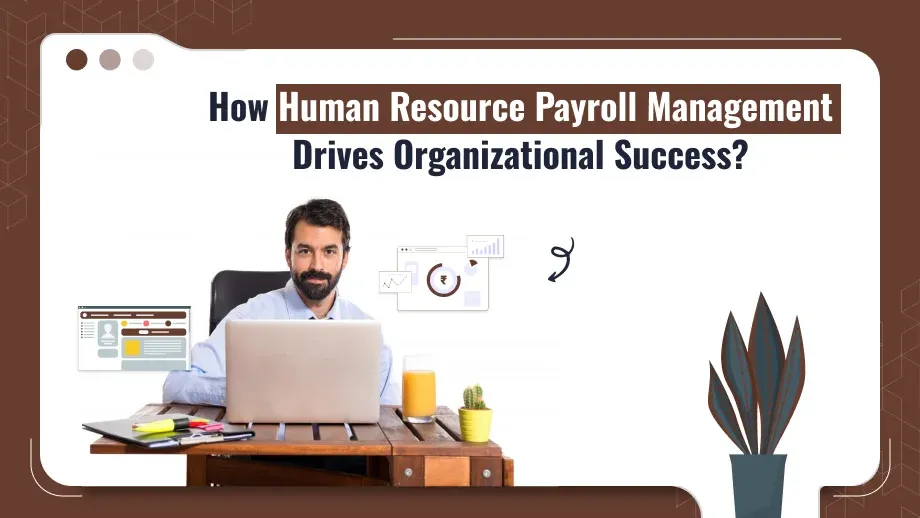
Human Resource Payroll sustainable growth within a competitive business environment can be facilitated and encouraged greatly with proper human resource payroll management. Your organization, whether small or huge multinational, in every type of payroll management is extremely critical for successful HR operations. The satisfaction of employees becomes significantly influenced by such a direct involvement towards efficient working.
Human resources and payroll management are considered the backbone of any company because it ensures employees’ correct and timely payments and coordinates the administrative, legal, and financial dimensions of labor compensation. The services by human resource payroll services coupled with payroll management software improve the HR procedures in business setups. This is coupled with minimizing human errors and adherence to laws on taxation and labor relations.
This article will examine the role that human resource payroll management plays in the performance of organizations and the reasons that HR professionals must invest in effective payroll solutions.
Understanding Human Resource Payroll Management
Before we get started on how human resources and payroll management drives success, it is important to understand the meaning of the term in detail. Human resource payroll management refers to the handling of employees’ compensation; this covers salaries, wages, as well as all bonuses and commissions, reductions, and taxes paid. Therefore, this involves determination of pay and timely as well as accurate payment of salary and most importantly, observing all appropriate tax and labor laws.
This would include payroll automation, minimizing errors, and saving time for HR departments. A modern HRMS & payroll software that works effectively would include payroll along with timekeeping, benefit administration, compliance tracking, among other human resource functions for ease for employees and employers alike.
Role of Payroll in Organizational Success
a) Employee Trust and Satisfaction
The first significant impact human resource payroll management has towards an organization’s success is in employee trust and satisfaction. Most employees are frustrated with any payroll error, delayed pay, or discrepancy in salary calculations that could cause decreased morale, turnover, and even lose the interest to stay at work. The more sure an employee is that compensation is correctly and timely made, they will be valued and devoted to the organization.
It has an effective human resources payroll system, ensuring accurate and timely paychecks. This will ensure accuracy and timeliness, thus improving the employees’ trust and therefore employee retention rates. This is one of the factors that will maintain a motivated workforce in achieving long-term organizational goals.
b) Efficiency and Time Savings
Processing payroll takes a long time, especially for companies with hundreds or thousands of employees. HR staff will have to do a lot of labor-intensive, repetitive, and regular work when it comes to calculations regarding deductions, taxes, and overtime compensation.With online payroll software and other payroll software available, the process can be mechanized to reduce the workload on the administrative side, so more time can be taken for HR teams to reflect on more strategic ideas on talent development, employee engagement, and organizational growth.
Modern payroll management software india eliminates manual calculations and interfaces with other Human Resource Payroll Management (like time-tracking and benefits administration) to provide a smoother workflow. That means it leads to improved efficiency and leaves more room for the HR professionals for improving the organizational culture as well as enhancing the productivity of their employees.
c) Cost Cutting and Budget Control
Inaccurate payroll can have serious financial implications, ranging from overpaying employees to tax law violations. More importantly, companies that are not automated in their payroll management experience high administrative costs as a result of needing additional staff, extra time spent on processing, and potential penalties for errors.
With a good human resource payroll system in place, the organization avoids expensive errors and administrative overheads. Payroll management software auto-computes tax elements and deductions of other financial elements in payroll processing, which reduces chances of errors from humans and manual intervention. More precise and streamlined payroll processing processes help a company to better control its payroll budget; minimize operational costs as well as avoid penalties against mismanaging payroll.
This implies that a strong HRMS & payroll software ensures your organization is in compliance with all local, state, and federal regulations because it automatically applies the most current tax rates and legal requirements. All information about employees is tracked through these systems, and it also automatically generates the needed reports of tax filings and benefits deductions, which saves HR teams from the hassle of tracking ever-changing rules. This helps ensure that payroll is always run in compliance with the relevant legislation, reducing the chance of non-compliance.
Transform your payroll management with Superworks’ seamless HRMS solution.
Book a demo today and experience effortless payroll processing!
e) Streamlined Employee Benefits Administration
Managing employee benefits including health insurance, retirement programs, and paid time off is another aspect of Human Resource Payroll Management. Payroll management and human resources systems may automate the registration and administration of employee benefits, guaranteeing that workers get the appropriate benefits and deduction amounts.
Payroll software gives an employee a clear view of the benefits, deductions, and other compensation-related information, so that he or she can take the right decision regarding the benefits. Seamless integration between payroll and benefits administration will ensure that the employees’ benefits are managed along with their pay, avoiding discrepancies or confusion. The automation of these processes also reduces the involvement of HR staff in such matters, so they can concentrate on strategic HR activities.
f) Better Decisions by Analytics
Another amazing payback of implementing a new, modern payroll management system is real-time data and insights for informing decisions. Payroll systems create volumes of information that include employee compensation, overtime, bonuses, and other forms of deductions. These data are very revealing to interpret, and they always show trends and whether equity does exist in any sense. It also provides the possibility of valuable reportage that has strategic value.
HR managers might, for instance, examine payroll data to spot potential areas where the business may be overpaying on benefits or spot patterns in overtime hours that can help with workforce planning. human resources payroll management may use the extensive reporting capabilities of advanced payroll software to make data-driven choices on workforce requirements, benefit plans, and compensation structures.
Benefits of Human Resource Payroll Management for Organizational Growth
a) Scalability for Growing Organizations
Payroll management becomes more complicated as businesses expand. Payroll management for a big, diversified workforce differs greatly from payroll management for a small team of workers. A scalable payroll system for human resources may grow with the company by adjusting to its changing requirements. Modern human resources payroll management can adapt to changes in benefit packages, employee counts, and geographic expansion without requiring a large investment in new personnel.
Unmatched scalability is provided by cloud-based online payroll software, enabling businesses to expand without fear of outgrowing their payroll infrastructure. Additionally, remote access is provided by cloud payroll solutions, guaranteeing that HR departments may oversee payroll operations at any time and from any location.This flexibility is especially beneficial for businesses with distributed teams or multiple office locations.
b) Global Payroll Management
Payroll management in several nations and jurisdictions may be challenging for businesses with global operations. Every nation has different payroll requirements, tax rates, and labor laws; handling these variations by hand is difficult and time-consuming.
Advanced HRMS & payroll software enables global payroll management, automating the complexities of managing payroll for employees across different countries. The systems ensure the right payment to the employee in accordance with the local laws and tax rates so that there is less possibility of errors and penalties. Moreover, global payroll solutions ensure centralized data management, enabling the human resources payroll management to track and manage payroll for all regions centrally, thereby providing more control and efficiency.
c) Data Privacy and Security
Employee pay data should always be private and secure. A bank account and a social security number that have been included on the employees’ payroll would require them to be very secret.
Most payroll systems adopted by modern human resource management payroll system departments have strong security measures like encryption, firewalls, and multi-factor authentication. Cloud-based payroll software will store data securely, sometimes making daily backups, thus avoiding loss of data. The privacy and security of payroll data protect employees, while it also helps organizations abide by the laws and regulations about the protection of data, for example, GDPR or CCPA.
Critical Characteristics of an Effective Human Resource Payroll management
Only when an organization implements a payroll system that possesses the following critical characteristics will it be able to use its human resources and payroll management to its fullest potential:
- Automated Payroll Calculations:Payroll management software should be able to compute taxes, deductions, overtime, bonuses, and wages automatically. By doing this, human mistakes are removed and workers are guaranteed to get fair compensation based on their agreed-upon income, the number of hours worked, and the current tax rates.
- Compliance Monitoring and Updates:A good modern payroll software automatically updates itself on the latest changes in tax laws, labour regulations, and wage requirements so your business will always be compliant.
- Reporting and Analytics:Advanced reporting capabilities make possible the immediate generation of Human Resource Payroll Management regarding payroll expense, tax liability, earnings by employee among others. Such information could then be used to facilitate better financial planning and decision-making.
- Employee Self-Service Portal:Employees may check their pay stubs, update their personal information, and change their benefits using an employee self-service site. Because they can easily access their payroll information, this lowers administrative effort and boosts employee satisfaction.
- Cloud Accessibility and Mobile Support:Cloud-based Payroll Software Company allows the HR teams and the employees to access the payroll data from any place on any device. It will be very helpful to companies who have remote or mobile employees.
Conclusion
Human resource payroll management is a backbone to organizational success. The right payroll system in human resource management is not only ensuring the timely and accurate processing of payroll but also helps the business save time, eradicate errors, and remain compliant with tax and labor law. As the organizations grow and advance, so does the need for investing in modern payroll software that is scalable, secure, and capable of integrating into other HR systems to assist business expansion and drive long-term success.
The bottom line of this focus on human resources payroll management and building trust among the employees, improved operational efficiency and enhancement of financial control, will only be that a better motivated and productive workforce awaits business to attain the much-sought results of gaining over the ever-increasing global competitive platform.







